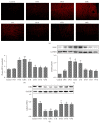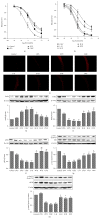Soy Isoflavone Protects Myocardial Ischemia/Reperfusion Injury through Increasing Endothelial Nitric Oxide Synthase and Decreasing Oxidative Stress in Ovariectomized Rats
- PMID: 27057277
- PMCID: PMC4753344
- DOI: 10.1155/2016/5057405
Soy Isoflavone Protects Myocardial Ischemia/Reperfusion Injury through Increasing Endothelial Nitric Oxide Synthase and Decreasing Oxidative Stress in Ovariectomized Rats
Abstract
There is a special role for estrogens in preventing and curing cardiovascular disease in women. Soy isoflavone (SI), a soy-derived phytoestrogen, has similar chemical structure to endogenous estrogen-estradiol. We investigate to elucidate the protective mechanism of SI on myocardial ischemia/reperfusion (MI/R) injury. Female SD rats underwent bilateral ovariectomy. One week later, rats were randomly divided into several groups, sham ovariectomy (control group), ovariectomy with MI/R, or ovariectomy with sham MI/R. Other ovariectomy rats were given different doses of SI or 17β-estradiol (E2). Four weeks later, they were exposed to 30 minutes of left coronary artery occlusion followed by 6 or 24 hours of reperfusion. SI administration significantly reduced myocardial infarct size and improved left ventricle function and restored endothelium-dependent relaxation function of thoracic aortas after MI/R in ovariectomized rats. SI also decreased serum creatine kinase and lactate dehydrogenase activity, reduced plasma malonaldehyde, and attenuated oxidative stress in the myocardium. Meanwhile, SI increased phosphatidylinositol 3 kinase (PI3K)/Akt/endothelial nitric oxide synthase (eNOS) signal pathway. SI failed to decrease infarct size of hearts with I/R in ovariectomized rats if PI3K was inhibited. Overall, these results indicated that SI protects myocardial ischemia/reperfusion injury in ovariectomized rats through increasing PI3K/Akt/eNOS signal pathway and decreasing oxidative stress.
Figures








Similar articles
-
Clematichinenoside attenuates myocardial infarction in ischemia/reperfusion injury both in vivo and in vitro.Planta Med. 2013 Sep;79(14):1289-97. doi: 10.1055/s-0033-1350671. Epub 2013 Aug 8. Planta Med. 2013. PMID: 23929248
-
Ophiopogonin D Reduces Myocardial Ischemia-Reperfusion Injury via Upregulating CYP2J3/EETs in Rats.Cell Physiol Biochem. 2018;49(4):1646-1658. doi: 10.1159/000493500. Epub 2018 Sep 18. Cell Physiol Biochem. 2018. PMID: 30227401
-
Catalpol decreases peroxynitrite formation and consequently exerts cardioprotective effects against ischemia/reperfusion insult.Pharm Biol. 2013 Apr;51(4):463-73. doi: 10.3109/13880209.2012.740052. Epub 2013 Jan 22. Pharm Biol. 2013. PMID: 23336403
-
Therapeutic Potential and Mechanisms of Novel Simple O-Substituted Isoflavones against Cerebral Ischemia Reperfusion.Int J Mol Sci. 2022 Sep 8;23(18):10394. doi: 10.3390/ijms231810394. Int J Mol Sci. 2022. PMID: 36142301 Free PMC article. Review.
-
The protective role of curcumin in myocardial ischemia-reperfusion injury.J Cell Physiol. 2018 Jan;234(1):214-222. doi: 10.1002/jcp.26848. Epub 2018 Jul 3. J Cell Physiol. 2018. PMID: 29968913 Review.
Cited by
-
Comparing the effect of tempe flour and tofu flour consumption on estrogen serum in ovariectomized rats.Heliyon. 2019 Jun 12;5(6):e01787. doi: 10.1016/j.heliyon.2019.e01787. eCollection 2019 Jun. Heliyon. 2019. PMID: 31245636 Free PMC article.
-
Protective Effects of A. sativa against Oxidative Stress-Induced Liver Damage in Ovariectomized Mice.Biomed Res Int. 2021 Jul 15;2021:5577498. doi: 10.1155/2021/5577498. eCollection 2021. Biomed Res Int. 2021. PMID: 34337029 Free PMC article.
-
Flavonoids in myocardial ischemia-reperfusion injury: Therapeutic effects and mechanisms.Chin Herb Med. 2020 Oct 28;13(1):49-63. doi: 10.1016/j.chmed.2020.09.002. eCollection 2021 Jan. Chin Herb Med. 2020. PMID: 36117755 Free PMC article. Review.
-
Long-term Ovariectomy Reduces Tolerance of Rats to Myocardial Ischemia-reperfusion Injury.Int J Endocrinol Metab. 2023 Jun 21;21(3):e135101. doi: 10.5812/ijem-135101. eCollection 2023 Jul. Int J Endocrinol Metab. 2023. PMID: 38028249 Free PMC article.
-
Chronic over-nutrition and dysregulation of GSK3 in diseases.Nutr Metab (Lond). 2016 Aug 4;13:49. doi: 10.1186/s12986-016-0108-8. eCollection 2016. Nutr Metab (Lond). 2016. PMID: 27493677 Free PMC article. Review.
References
-
- Lagranha C. J., Deschamps A., Aponte A., Steenbergen C., Murphy E. Sex differences in the phosphorylation of mitochondrial proteins result in reduced production of reactive oxygen species and cardioprotection in females. Circulation Research. 2010;106(11):1681–1691. doi: 10.1161/circresaha.109.213645. - DOI - PMC - PubMed
Publication types
MeSH terms
Substances
LinkOut - more resources
Full Text Sources
Other Literature Sources
Molecular Biology Databases

